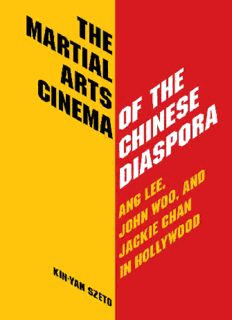
The Martial Arts Cinema of the Chinese Diaspora: Ang Lee, John Woo, and Jackie Chan in Hollywood PDF
Preview The Martial Arts Cinema of the Chinese Diaspora: Ang Lee, John Woo, and Jackie Chan in Hollywood
The Martial Arts Cinema of the Chinese Diaspora The Martial Arts Cinema of the Chinese Diaspora Ang Lee, John Woo, and Jackie Chan in Hollywood Kin-Yan Szeto Southern Illinois University Press Carbondale and Edwardsville Copyright © 2011 by the Board of Trustees, Southern Illinois University All rights reserved Printed in the United States of America 14 13 12 11 4 3 2 1 Library of Congress Cataloging-in-Publication Data Szeto, Kin-Yan, [date]. The martial arts cinema of the Chinese diaspora : Ang Lee, John Woo, and Jackie Chan in Hollywood / Kin-Yan Szeto. p. cm. Includes bibliographical references and index. ISBN-13: 978-0-8093-3021-8 (pbk. : alk. paper) ISBN-10: 0-8093-3021-0 (pbk. : alk. paper) ISBN-13: 978-0-8093-8620-8 (ebook) ISBN-10: 0-8093-8620-8 (ebook) 1. Martial arts films—United States—History and criticism. 2. Lee, Ang, 1954– —Criticism and interpretation. 3. Woo, John, 1948– — Criticism and interpretation. 4. Cheng, Long, 1954– —Criticism and interpretation. I. Title. PN1995.9.H3S94 2011 791.43´657—dc22 2010038673 Printed on recycled paper. The paper used in this publication meets the minimum requirements of American National Standard for Information Sciences—Permanence of Paper for Printed Library Materials, ANSI Z39.48-1992. Contents Acknowledgments vii Introduction: Cosmopolitical Consciousness, Film, and Transnationalism 1 1. Martial Arts Cinema, the Chinese Diaspora, and Hollywood 13 2. Ang Lee’s Crouching Tiger, Hidden Dragon: Gender, Ethnicity, and Transnationalsim 33 3. Facing Off East and West in the Cinema of John Woo 71 4. Jackie Chan and the Politics of Comic Displacement 113 Conclusion: Cosmopolitical Thinking 144 Notes 153 Bibliography 157 Index 167 Acknowledgments T his book has benefited from the contributions of many people. I extend my deepest gratitude to Margaret Drewal, Chuck Kleinhans, and Dwight Conquergood for their insight, guidance, and inspiration that shaped this project. Their advice and encouragement have driven me to expand my own horizon and abilities. I am grateful to the Hong Kong Film Directors’ Guild, the Hong Kong Film Archive, Centro Digital Pictures, and the China Film Archive for providing resources. I wish to thank the Lilla Heston Fellowship, the China Times Cultural Foundation Young Scholar Award, and the Appalachian Foundation Fellowship for their financial support in making this research project possible. I would also like to thank the editorial board and production staff at Southern Illinois University Press for their help and professionalism at every stage in the process of production. I am very appreciative of the generous com- ments and suggestions from the anonymous reviewers. Modern Chinese Literature and Culture has kindly granted me permission to include in my book the revised version of the previously published essay “Jackie Chan’s Cosmopolitical Consciousness and Comic Displacement” (Mod- ern Chinese Literature and Culture 20.2 [2008]: 229–60). vii The Martial Arts Cinema of the Chinese Diaspora
Description: